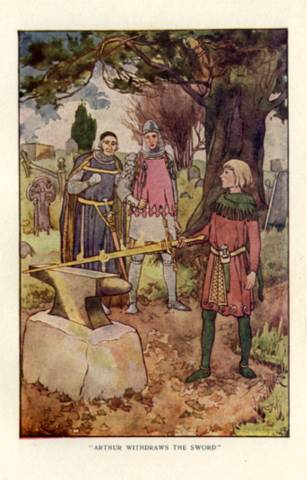 The Kobold Guide to Magic is written by a star-studded cast of designers and authors. Here’s an excerpt about prophecies from Ed Greenwood’s essay, “The Quest for Great Lost Magic.” Pre-order The Kobold Guide to Magic at the Kobold Store!
The Kobold Guide to Magic is written by a star-studded cast of designers and authors. Here’s an excerpt about prophecies from Ed Greenwood’s essay, “The Quest for Great Lost Magic.” Pre-order The Kobold Guide to Magic at the Kobold Store!
In the divine lore, local folklore, and magical lore of any fantasy setting, it’s important to consider the wording of legends or prophecies. “Whosoever draws this sword from this stone shall henceforth be rightful king of all England” is fine, because it speaks of status, not performance. (History and fiction are both full of “rightful kings” who rule nothing and no one but spend their days shoeing horses or baking bread or shingling cottages, some in ignorance of their heritage, others hiding in fear of losing their heads, and still others shunning a role they don’t want or know they’re horribly suited for.) “Henceforth be rightful king” is just vague enough, and works; “henceforth rule over” is not.
Why? Well, when a roleplaying setting has firm, clear destinies along the lines of “The one who bathes me in the blood of a dragon shall know eternal life, shall smite and throw down all foes, and shall reign in the Castle Tall forevermore,” that setting also has a big problem. If a PC is just following a script (if you do X, then Y shall assuredly follow because the gods, or the hidden gods above the gods, decided as much, eons ago), where’s your heroism? Where are the moral choices that give any life, real or imagined, value? The weight of pride behind stories about “When my character went up against the Great Galadorn Dragon, and slew him”?
Nowhere, that’s where. Free choice and action are gone, predestination governs everything, and heroism is out the window; the best one can hope for is “How much style did you bring to your role, as you followed the script exactly?” The escapism, the fulfillment, the creativity that roleplaying games are supposed to offer—as opposed to other sorts of games defined by long and detailed rules—have been lost and sacrificed.
Of course, none of this stops legends from being exaggerated or out-and-out wrong. Yet it’s so much better when they’re weasel-worded just enough that they seem to imply one thing but promise something different.
“When the unhooded one reigns in Caer Florivel, the dragon lies beheaded on Stone Mountain, and Rorvar Redhanded has won his lady love, then shall fair Poincedonea know a new golden age” is fine. It sets forth three conditions that must come to pass (three quests that don’t sound like they’ll be all that easy, nor alike each other in their achievement), and it proclaims a warm, fuzzy, and vague result. What’s a “new golden age,” exactly? Well, what was the “old golden age” of Poincedonea like? No one can remember or agree? Good! (At least for ongoing roleplaying campaign purposes. If I were writing a novel that ended with the apparent achievement of this “new golden age,” the last paragraph or two would reveal that there were still unfolding problems, and that the unhooded one had vanished from Caer Florivel, and Rorvar quarreled with his lady love, and the onstage characters would look at each other, groan, and say something like “Of course,” or “What else?” or “Somehow, I expected no less.”)
So always leave a little elbow room. Be vague enough to let a new subplot wriggle out.

Good to not paint yrself into a corner when the PC’s fly off the rails. Excellent advice from the sage. Happy 2014 to Ed and all!!!
As always, solid advice from Ed.
Reminds me of the story plotting suggestions to add clauses and modifiers to every point, even ones that seem clear cut.
Happy New Year to everyone at Kobold Press.
Prophecies played a major role in a 4 year campaign in which I was the DM. Most of the time I had a “title” instead of a description, in such a way that I could always adjust and adapt to what was happening and to the choices the characters were taking. I numbered 77 titles and they composed the 7 chapters of the whole campaign. Unfortunately we never got to the end of it but all who remember that campaign always ask me how it’d have finished if we’ve ever gotten to that very end. This is certainly the most magical form to make stories sound true and prophecies look impressive.
I really like the excerpt. The full essay is great as well, and the editor tells me there’s a whole chapter on oracles and prophecies in there somewhere.
How is it that every time I read something by Ed I’m back as a teenage gamer…
As others have said already, great excerpt, and one that realy wants me to read more from a master.
Huzzah!
Sound advice from the sage himself.